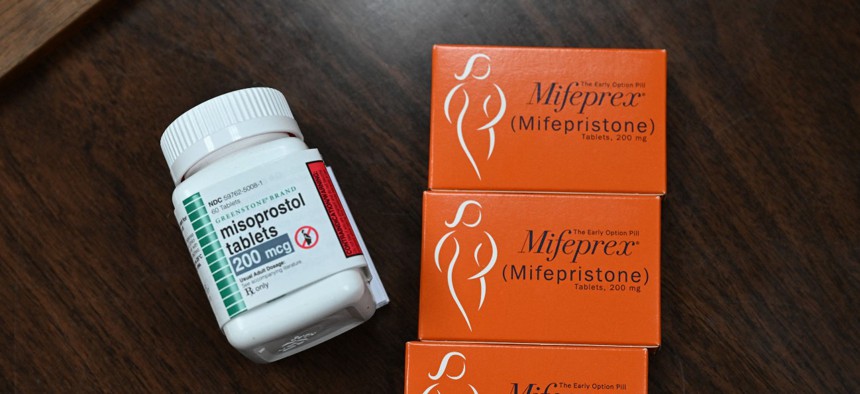
The two pills used in combination for medication abortions are shown at a reproductive clinic in New Mexico. ROBYN BECK/AFP via Getty Images
USPS: It's Up to Mailers to Comply With State Laws on Abortion Pills
The Postal Service says it will not crack down on the mailings, while the Biden administration promises to use the mail to expand access to the pills.
The U.S. Postal Service will not proactively help states enforce laws prohibiting the use of abortion pills in the wake of the Supreme Court overturning Roe v. Wade, despite many legislatures vowing to crack down on the practice.
Advocates have increasingly pointed to the prescription drugs mifepristone and misoprostol—which, when taken in tandem, can safely terminate pregnancies—to help boost access to abortion services for those in states with limited or no other options. The Food and Drug Administration eased the delivery of the pills in December when it permanently lifted a requirement that they be administered in person. With abortion services now illegal in several states—a number expected to grow significantly in the coming weeks—it remains unclear how accessible the pills will remain. Medication abortion accounts for 54% of abortions in the United States, according to the Guttmacher Institute, a reproductive health organization.
Asked whether USPS will conduct any sort of screening to ensure abortion pills do not go to states where they are banned, Kim Frum, an agency spokesperson, said, “Federal law and Postal Service regulations determine what can and can’t be mailed.”
“The mailer is responsible for ensuring that all Postal Service requirements, as well as all federal and state laws and local ordinances that apply to the shipment of hazardous, restricted, and perishable matter, have been met,” Frum said. She added USPS is bound by its “universal service obligation” to provide mail to all 161 million U.S. addresses.
Many states had already prohibited the use of telehealth to receive abortion pills prior to the Supreme Court’s ruling last week, while others had banned them outright after a certain number of weeks of pregnancy. Attorney General Merrick Garland said states could not ban the pills, as the FDA’s approval carried precedence.
“We stand ready to work with other arms of the federal government that seek to use their lawful authorities to protect and preserve access to reproductive care,” Garland said. “In particular, the FDA has approved the use of the medication mifepristone. States may not ban mifepristone based on disagreement with the FDA’s expert judgment about its safety and efficacy.”
Garland further stated any federal employees who carry out their duties by providing services related to abortion would be protected from liability.
In its own statement, the White House vowed specifically to leverage USPS to make abortion pills more widely available.
“In the face of threats from state officials saying they will try to ban or severely restrict access to medication for reproductive health care, the president directed the Secretary of Health and Human Services to identify all ways to ensure that mifepristone is as widely accessible as possible in light of the FDA’s determination that the drug is safe and effective—including when prescribed through telehealth and sent by mail,” the White House said.
It remains unclear how state prosecutors could prevent abortion pills from coming into their jurisdictions without assistance from the Postal Service. States are facing legal challenges to their efforts to block FDA-approved drugs. Online providers that can prescribe and send abortion pills generally reject patients in states where telehealth services are banned, but individuals could simply use a third party. Some organizations are setting up mobile sites at state borders so patients can cross over and legally order the drugs. An organization based in Austria, Aid Access, has also said it will continue sending abortion pills to those who request them, even in states where they are illegal.
“Unless they have a way to open your mail, or set up and watch you in your house, how?” said Laurie Bertram Roberts, who runs the Yellowhammer Fund, a reproductive justice organization in Alabama, asking how a state like hers could prosecute those who still receive abortion pills. “First-class mail can’t just be randomly opened…what would be their cause to go through everyone’s mail?”
International packages are screened by Customs and Border Protection, but the international mail centers have been overwhelmed by illicit substances in recent years and likely do not have the capacity to search for FDA-approved drugs. Harry Nelson, an attorney focusing on health care law, said states seeking to block the drugs will likely have little recourse.
“Since this is a federal function, state governments are going to have no ability to interfere in the delivery of the mail,” Nelson said. “As a result, my expectation is that there will be no practical way to prevent the ongoing flow of these medications into abortion-hostile states.” He added if those states attempted to prosecute domestic entities supporting access to abortion pills, the abortion-friendly states that house them would simply not comply.
The Postal Inspection Service, USPS' law enforcement arm that works with the mailing agency, CBP and others on crimes that take place within the mailing system, declined to comment in time for publication.







